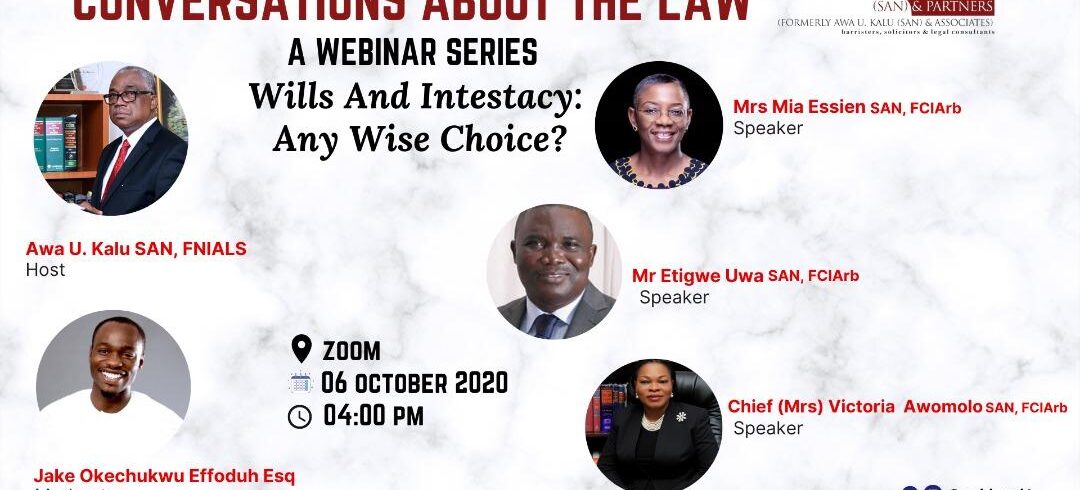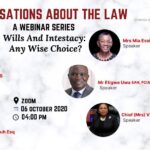PROF AWA KALU (SAN) is a renowned academic and respected member of the inner bar. In this interview with Ise-Oluwa Ige, he is strongly of the view that the time limit of 21 days to file election petitions from the day of declaration of poll results and a maximum of 180 days for the tribunals to deliver their judgements in writing from the date of filling of the petitions are not sufficient. He is suggesting a radical amendment to section 285 (5) and (6) of the 1999 Constitution (as amended) to ensure justice for aggrieved losers in elections.
So many election petitions challenging results announced by INEC in the last general election are on-going. Aggrieved losers in those elections had filed their petitions before the tribunals within 21 days after the declaration of election results by INEC as required by the 1999 constitution while the tribunals themselves have 180 days to deliver their judgments in writing from the date of the filing of the petitions. From experience sir, how sufficient are these time frames?
Well, setting 21-day time frame to file petitions challenging the conduct of different categories of election in Nigeria is very ridiculous. For presidential election for instance, the totality of the country is its constituency.
This is because you are talking of challenging the election conducted in 36 states of different sizes and the Federal Capital Territory (FCT). And the law allows the petitioner that is the loser, 21 days to gather his materials and articulate his grievances in a form that can be prosecuted before the tribunal within 21 days. I say without any fear of contradiction that the time limit is extremely ridiculous. You will appreciate the ridiculousness of this constitutional provision when you reconcile this with the fact that the same 21 days was also given to petitioners to file his petitions for other categories of election.
Unlike the presidential election, For instance, the governorship election, covers just the whole state. The states are also of different sizes. Yet, the same 21 days was allocated to challenge election conducted therein. If you are, also, doing a challenge say in Kano state where you have about 44 local governments, or in Ebonyi where you have less than 15 local governments, it is the same 21 days. If you are challenging the victory of a candidate in Lagos state where you have not less than 15 million people, it is also 21 days. If you now step down, let’s say national assembly election, like the senate, each state has three senators. So, a senatorial district is one third of a state. You also have 21 days to file. You are looking at House of Representatives. The constitution allows a minimum of 8 representatives per state.
The minimum is eight no matter the size of the state. So, a constituency of the house of representative election is one eighth of the state in question. You also have 21 days to file. For house of assembly seat, some house of assembly constituencies cover just a local government. It is also 21 days. For chairmanship and councillorship elections at the local council level, it is also 21 days. I am doing this analysis deliberately to allow you come to the conclusion with me that there is no way one can justify a law that allows 21 days for the filing of presidential election and the same number of days for house of assembly election. I think the time limit is embarrassing and the imbalance must be corrected if we are to be seen as serious.
Similarly, the time limit for starting and finishing the presentation of an election petition is also limited to 180 days, irrespective of whether it is a presidential election or house of assembly election. I should also say that it is ridiculous. I will draw your attention to a decision of the Supreme Court on an appeal arising from presidential election petition by Gen Muhammadu Buhari against the election of President Olusegun Obasanjo in 2003. The Supreme Court made a comment that is very germane to this issue. I will give you the law report. Specifically, the Supreme Court says you will need a minimum of 250,000 and 300,000 witnesses to establish a case of non-compliance in the conduct of presidential election which constituency is the entire 36 states of the Federation and the Federal Capital Territory (FCT) and prove the ingredients of successful election petition.
Is it really possible to examine 300,000 witnesses in an election petition proceedings which judgment must be delivered within 180 days assuming it is possible to file witness’s statements on oath within the 21 days?
That is the problem. It is not possible to file 250,000 witness statements on oath within 21 days. Even if you can file which is not possible anyway, you know lawyers, by nature, they know how to utilise opportunities provided by the law either for good or for bad. The present procedure for election presentation is that for a witness, all you are expected to do is to file a witness statement on oath, then his examination in chief is limited to adopting the witness statement on oath and usually, the tribunal will limit time for cross-examination. But the time for cross examination differs from tribunal to tribunal. For instance, if a witness is a star witness, says the petitioner, they allow more time for adopting the witness statement on oath, adoption of tons of documents and at the same time for cross examination. That is to say that tribunal at trial level are more generous towards witnesses in terms of time. But what you find in practice is that the onus is for the petitioner to prove substantial non-compliance. It is usually a mountain climbing experience. You know what it is to climb a mountain. That is always what it is for a petitioner to prove malpractices that will result in election being upturned. To answer your question, it is not possible to file 300,000 witness statements on oath within the allotted time
I can tell you that it is not possible. Even if you are a magician, you can’t file 30,000 witness statements on oath in 21 days. It is not just possible. This is because you are proving what has been explained to form part of the requirements for election malpractice. What the Supreme Court and other courts that deal with election matters explain is that for a challenge to show noncompliance, you have to start in a pyramidal way which is what the Electoral Act contemplates. You look at the units’ results. That is where the compilation of the results starts from. The results are transferred to the ward level. From ward level to the local govt level, then to the state. For presidential election, from states to Abuja. So, each step has to justify whatever case you have. If it is the unit level, looking at the totality of the units that make up the totality of Nigeria, you will discover that it is a big task. At some state level, you have 3,000 or more. That means, like 3000 multiplied by 36, you see where the problem is. That is why the Supreme Court says a minimum of 300,000 witnesses will be needed to prove a petition seeking to upturn presidential electoral victory. This is exactly what the late Hon Pat Acholonu said in Buhari and Obasanjo which was decided in February 2005: “the very big obstacle which anybody who seeks to have the election of somebody that wins presidential election faces is the very large witnesses he must call due to the size of different constituencies. In a country like our own, he will need to call about 250,000 to 300,000 witnesses. By the time the court would have heard from all of them with the way our law is couched, the incumbent would have long finished and left office. And even if the petitioner eventually wins, it will be an empty victory bereft of no substance. That is at the Supreme Court”
But at the time the Supreme Court made this observation, there was no time limit for the tribunal to deliver judgments in election petitions. So, why were the drafters not guided by this kind of opinion?
Yes, there was no time limit. That makes it more complicated now that there is time limit. When there was no time limit, by the time you called 250,000 and 300,000, witnesses, the president elect would have finished his four year tenure. And so, even if you win, late Justice Acholonu said it would be an empty victory bereft of any substance. That is the point.
In view of this position by the Supreme Court on this issue, what do you think should be done to the aspect of our law on this time limit?
I have said in different places that my private view is that we need a major constitutional adjustment. That adjustment is that nobody must be sworn in as anything whether president or governor or law makers until the petition has been exhausted. This means if you have an election say in 2019, you begin the election process much earlier. Everything concerning the timelines will be adjusted. It is just to pull back to make allowance for the 180 days so that by May 29, the democracy day, the 180 days which you require at the tribunal, the 60 days which you require at the Supreme Court would have completely exhausted. In the advanced countries, the election petitions are not rampant. They are not as widespread as it is in Nigeria. It is therefore my humble opinion that the election process itself should be transparent to enable any candidate to be convinced that he has either won or lost and be satisfied that he did his best. There is nothing that does not have its margins of error, even scientific research. So, you are not executing an electoral process that is free from error. But if the error is such as should be accepted, not the kind of daylight robbery we are seeing, in our own situation, I’m sorry to call it robbery but that is what it is in some cases. We have to think very seriously and be generous with ourselves in acknowledging that if we need to move forward, preserve some democratic legacies, then the process ought to be transparent.
I think that the 21 days is sufficient for filing of petitions challenging elections into the house of assembly and the House of Representatives even for the senate. But there is no way you can allow 21 days for governorship or for the presidency. So, a strategic adjustment is what is needed, possibly, for the presidency, 45 states. This I because we have 36 states plus the FCT and the states are of different sizes. For the governorship, 35 days is okay.
You will also need to enlarge the 180 days sequentially. You can’t have 180 days for presidential, governorship, senatorial, house of reps, state assembly, local council and chairmanship. It does not make mathematical sense or even common sense. And my level of Mathematics is enough for me to know that the limit is not enough to prove substantial non-compliance.
SOURCE : AUTHORITY NIGERIA




